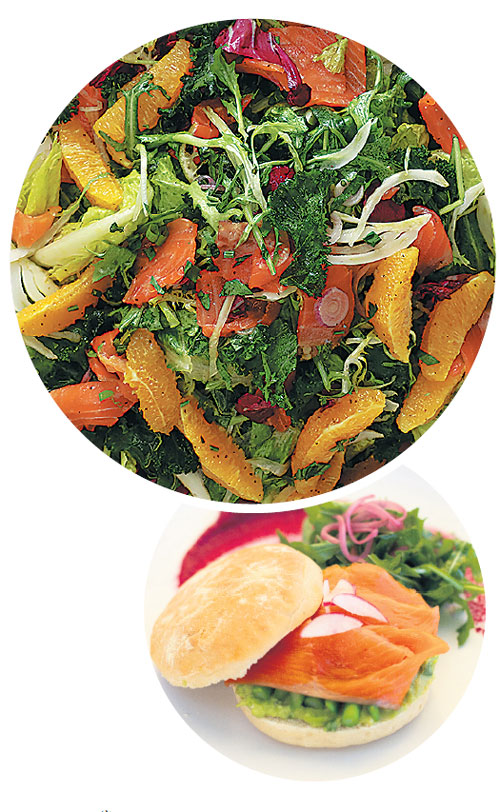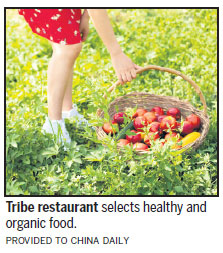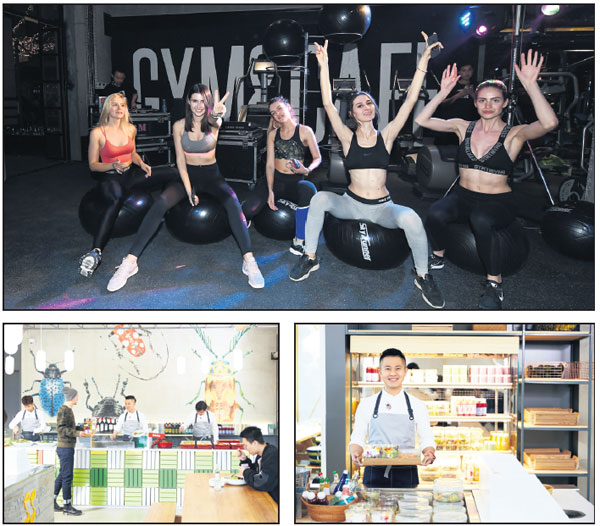As fit as a fiddle, as thin as a rake
Yu Min reckons the formula for being healthy boils down to just two figures: 70 and 30.
"Everybody knows that building a healthy body is 70 percent healthy eating and 30 percent exercise," says Yu, the owner of Tribe, a restaurant chain that prides itself on its healthy dishes and has three outlets in Beijing and one in Shanghai.
"The least you can do if you can't find the time to exercise is to eat healthily."
|
Like a washing machine or a restaurant, a gym should have all the features that a customer wants. |
|
Building a healthy body is 70 percent healthy eating and 30 percent exercise. Photos Provided to China Daily |
|
In a gym-cum-restaurant, it is not just about eating a bit of salad. It's a new lifestyle in which you can have a proper meal or a cup of coffee after exercise. |

Putting her 70/30 formula into practice, one Saturday morning Yu attends a yoga class in Shanghai and later, with a dozen of the class members, caps off the exercise with a brunch at her restaurant that may include gluten-free pumpkin bread combined with scrambled eggs, avocado, cheddar, onion, tomato and yogurt and coffee.
Yu says she enjoys starting the day like this, matching various kinds of morning exercises with a choice of healthy breakfast food.
Aiming to build a platform for people who care about living a healthy lifestyle, Yu quit her job as a brand consultant in 2013 and opened her first Tribe restaurant in the Sanlitun area of Beijing the following year. Tribe now has four outlets, one in Shanghai and three in Beijing.
Earlier, convincing Chinese about the importance of a balanced diet and good food had been an uphill battle, she says.
"Then a couple of years ago people suddenly seemed to start caring about healthy eating. At first fruit and vegetable juices were all the rage, then salad became very popular.
"We educated our customers about the importance of eating nutritionally balanced food with enough protein, and now they seem to have realized what real healthy food is."
Yu insists on using organic ingredients in all Tribe's food and asks chefs not to use artificial additives. All the sauces are freshly made, she says. Even chili oil comes from chili pepper, ground by hand.
"White sugar is barred in my restaurant, and we use honey for sweetness. But the food does not just have to taste good; it needs to look good, too. I ask the chefs to make the most of presentation so that everything is colorful and nutritious as well."

In the four years that the Tribe Sanlitun outlet has been open, Yu says, it has sold more than 48,000 brunch salads, using a total of more than 230 ingredients, and more than 50,000 grain bowls, and served more than 30,000 cups of Americano coffee and more than 5,500 glasses of "green energy cold pressed juice".
"In addition to good eating, if you can do exercise at least once or twice a week it's going to be beneficial," says Yu, who organizes various kinds of exercise for customers.
Last year Tribe held an event combining healthy dining with exercises - that included games of box jumping, kettle-bell lifting and burpees (a push-up where the chest touches the ground followed by a jump in the air with both hands held behind their ears) - and ended with an organic buffet.
Li Chen, who started eating salad three years ago, says she practices yoga each morning. She became familiar with the benefits of healthy eating, at the time she switched on to salads, when she joined a three-month training program organized by Sweetie Salad, now updated to Delight - a subbrand of HIA in Shanghai and Beijing that offers dishes aimed at the health conscious and which offers a delivery service.
Over the three month training program, the company offered a dozen volunteers free salad twice a day Monday to Friday and free training courses.
Li says she lost 7.5 kilograms while she was on the program, and since then eating salads has become second nature to her.
"I met a bunch of interesting people in the program and we became good friends. You realize that something that seemed impossible, such as eating salad for three whole months, is in fact doable. As my eating habits changed, so did my body. Apart from losing weight my skin has become healthier and I slept a lot better."
Huo Tingkun, marketing director of HAI, says the aim in using the volunteers on the program three years ago was to find out how effective it was, and this entailed interviewing those taking part.
"We wanted to know how much weight they wanted to lose, to get them onto the program and then to hear their stories."
All volunteers managed to achieve their goals after three months, Huo says, and a photo shoot was arranged so that they could show off their trimmer bodies.
"Even I had not known how to eat correctly, and from then I started to learn about how to pair exercise with food," Huo adds.
HAI opened its first restaurant, Green Option, in Beijing in May and now takes orders for immediate delivery, whereas previously dishes needed to be ordered a day in advance.
Having a physical restaurant gives online customers a place to gather, Huo says, and Sweetie Salad is working with gyms offering free training courses for its customers.
While restaurants specializing in healthy food are forming business partnerships with gyms or fitness studios, gyms are getting in the act by selling healthy food.
One such is A Plus Fitness, a chain in Beijing that opened a dining area in 2016 offering meals to members and walk-in customers.
One of the coaches at A Plus Fitness, Yu Xiang, says that in addition to his physical training duties he now asks members to take photos of each meal they eat and send them to him for comment.
"I give them advice on how to eat each day and amend their training plans according to how much and what they eat. Diet can help you lose weight, while training is aimed at making your body look better."
Members are getting more information than ever before about eating and exercise "but that does not mean that by themselves they can put that theory into practice", he says.

"I put training plans together for members according to their needs, whether it be losing weight or gaining muscles, and pair that with proper eating advice."
Sometimes, before a member starts training, Yu asks Yuan Meng, chef in A Plus Fitness' canteen, to prepare a meal for the member to be eaten once training is over.
Yuan, who used to work for five-star hotels as a chef, says he started working out two years ago, losing about 35 kilograms by combining that with healthy eating.
"I've tried many light salads, but they lack flavor, and I reckoned I could do something better. So I took the job as a chef here. Anyone wanting to lose weight can cut back on how much they eat, but it's wrong to stop eating."
At the canteen, Yuan says, he continues to learn about nutrition and devising new dishes. He wants to dispel the common misconception that if you are dieting you are limited to eating the likes of boiled vegetables and chicken.
At A Plus Yuan likes to get out of the kitchen when he has the time and talk with members, even giving them training advice.
"The good thing is that, unlike when I was working in restaurant kitchens, I can now chat with customers, and they are always giving me feedback on what the food is like," Yuan adds.
A new gym-cum-restaurant, Mode-L, opened in the Wangjing area of Beijing in May, and its owner, Li Wen, says it is the first of its kind in the capital.
Li, who used to play soccer professionally, became an habitue of gyms after he retired eight years ago.
He started designing his own gym last year and decided that it must include an area for healthy eating.
"Like a washing machine or a restaurant, a gym should have all the features that I want as a customer," he says.
Mode-L recruited Brandon Trowbridge, an American chef who is an expert on vegan cuisine to design the menu - which includes, however, meat dishes for those who feel they need more protein.
All the meats are cooked and packaged in the central kitchen and delivered to the restaurant each day, so the restaurant's kitchen directly handles only vegan ingredients.
Li says it is more like running a community that brings all his members together to get fit and eat healthily, and organizing outdoor events for them such as skiing or surfing.
"This is not just about eating a bit of salad from the fridge. It's a new lifestyle in which you can have a proper meal or a cup of coffee after exercise."
liyingxue@chinadaily.com.cn
(China Daily European Weekly 08/03/2018 page1)

























